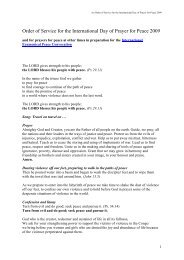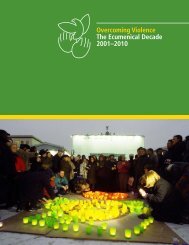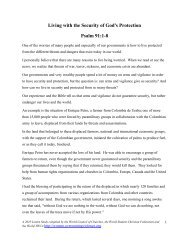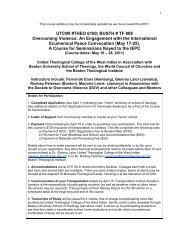Alternative Globalization Addressing Peoples and Earth
Alternative Globalization Addressing Peoples and Earth
Alternative Globalization Addressing Peoples and Earth
You also want an ePaper? Increase the reach of your titles
YUMPU automatically turns print PDFs into web optimized ePapers that Google loves.
Such movements of resistance have slowed the expansion of oppressive<br />
<strong>and</strong> unjust trade rules <strong>and</strong> agreements. But they are far from replacing the<br />
present rules of trade with a regime that gives primacy to the ethical <strong>and</strong><br />
survival principles of just trade. The major powers have unleashed a<br />
potentially devastating wave of bilateral <strong>and</strong> regional agreements that<br />
perpetuate the same model of economic dominance because these rules<br />
must be WTO-compatible, including measures that are “WTO plus”,<br />
which is more far-reaching than the WTO itself. Negotiating power is<br />
even more unequal, <strong>and</strong> dependency on aid <strong>and</strong> trade has forced<br />
governments to make commitments that could destroy their economies<br />
<strong>and</strong> deepen their dependency. In some cases, the US has even conditioned<br />
access to trade concessions on a country’s compliance with its foreign<br />
policy <strong>and</strong> security interests.<br />
Regional agreements such as the Free Trade Area of the Americas<br />
(FTAA / ALCA) <strong>and</strong> the Regional Economic Partnership Agreements<br />
between the European Union <strong>and</strong> Africa, the Caribbean <strong>and</strong> the Pacific<br />
reflect the same power imbalance that benefits transnational<br />
corporations to the detriment of national capital investment <strong>and</strong><br />
domestic markets. A 2003 Buenos Aires consultation jointly organized<br />
by the WCC <strong>and</strong> the Latin American Council of Churches (CLAI)<br />
together with other partners decried the FTAA as embodying a model<br />
of competition between unequal partners that will inevitably entail the<br />
submission or elimination of the weakest. Again, resistance movements<br />
throughout the Americas have harnessed popular democracy so that<br />
the people’s voices are heard in creative ways through people’s referenda,<br />
hemispheric mobilization <strong>and</strong> the articulation of trade rules based on<br />
social justice <strong>and</strong> self-determination.<br />
A potentially effective alternative are the regional <strong>and</strong> sub-regional<br />
agreements that strengthen the capacity of poor <strong>and</strong> vulnerable countries<br />
to promote <strong>and</strong> protect their own interests. However, these must be based<br />
on models of just trade <strong>and</strong> not on models of so-called “free trade” that<br />
the current straitjacket of WTO compatibility requires. They must also<br />
incorporate the proportionality principle, which protects the poor <strong>and</strong><br />
the weak in exchanges between unequal partners.<br />
Resistance is important, but it is not enough. New visions are needed to<br />
support new rules, articulated by the people themselves <strong>and</strong> backed by<br />
ethical challenges formulated by social movements <strong>and</strong> churches, before<br />
there can be genuine change.<br />
The following principles for just trade agreements can serve as indicators<br />
of an alternative paradigm on trade. Trade agreements must:<br />
• be premised on the basic principles of the economy of life: solidarity,<br />
23











